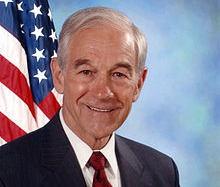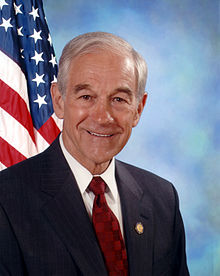Ron Paul

12-Term Congressman Ron Paul’s Warning to Americans about the Coming Currency Crisis
Ronald Ernest “Ron” Paul (born August 20, 1935) is an American physician, author, and former Republican congressman, two-time Republican presidential candidate, and the presidential nominee of the Libertarian Party in the 1988 U.S. presidential election.
Paul served as the U.S. Representative for Texas’ 14th and 22nd congressional districts. He represented the 22nd congressional district from 1976 to 1977 and from 1979 to 1985, and then represented the 14th congressional district, which included Galveston, from 1997 to 2013. On three occasions, he sought the presidency of the United States: as the Libertarian Party nominee in 1988 and as a candidate in the Republican primaries of 2008 and 2012. Paul is a critic of the federal government’s fiscal policies, especially the existence of the Federal Reserve, the tax policy, the military–industrial complex, and the War on Drugs. Paul was the first chairman of the conservative PAC Citizens for a Sound Economy and has been characterized as the “intellectual godfather” of the Tea Party movement.
A native of the Pittsburgh suburb of Green Tree, Pennsylvania, Paul is a graduate of Gettysburg College and the Duke University School of Medicine, where he earned his medical degree. He served as a flight surgeon in the U.S. Air Force from 1963 to 1968. He worked as an obstetrician-gynecologist from the 1960s to the 1980s. He became the first Representative in history to serve concurrently with a son or daughter in the Senate when his son, Rand Paul, was elected to the U.S. Senate from Kentucky in 2010.
Paul is a Senior Fellow of the Mises Institute, and has been an active writer, publishing on the topics of political and economic theory, as well as publicizing the ideas of economists of the Austrian School such as Murray Rothbard and Ludwig von Mises during his political campaigns. Paul has written many books on Austrian economics and classical liberal philosophy, beginning with The Case for Gold (1982) and including A Foreign Policy of Freedom (2007), Pillars of Prosperity (2008), The Revolution: A Manifesto (2008), End the Fed (2009) and Liberty Defined (2011).
On July 12, 2011, Paul announced that he would forgo seeking another term in Congress in order to focus on his presidential bid. On May 14, 2012, Paul announced that he would not be competing in any other presidential primaries but that he would still compete for delegates in states where the primary elections have already been held. At the 2012 Republican National Convention, Paul received 190 delegate votes. In January 2013, Paul retired from Congress but still remains active on college campuses, giving speeches promoting his libertarian vision.
Economic
Paul is a proponent of Austrian School economics; he has authored six books on the subject, and displays pictures of Austrian School economists Friedrich Hayek, Murray Rothbard, and Ludwig von Mises (as well as of President Grover Cleveland) on his office wall. He regularly votes against almost all proposals for new government spending, initiatives, or taxes; he cast two thirds of all the lone negative votes in the House during a 1995–1997 period.
He has pledged never to raise taxes and states he has never voted to approve a budget deficit. Paul believes that the country could abolish the individual income tax by scaling back federal spending to its fiscal year 2000 levels; financing government operations would be primarily by excise taxes and non-protectionist tariffs. He endorses eliminating most federal government agencies, terming them unnecessary bureaucracies.
On April 15, 2011, Paul was one of four Republican members of Congress to vote against Rep. Paul Ryan’s budget proposal, known as “The Path to Prosperity.”
Paul has consistently warned of hyperinflation as far back as 1981. While Paul believes the longterm decrease of the U.S. dollar’s purchasing power by inflation is attributable to its lack of any commodity backing, he does not endorse a “return” to a gold standard – as the U.S. government has established during the past – but instead prefers to eliminate legal tender laws and to remove the sales tax on gold and silver, so that the market may freely decide what type of monetary standard(s) there shall be. Since 1999, he has introduced bills into each Congress seeking to eliminate the Federal Reserve System in a single year.
He endorses free trade, rejecting membership in the North American Free Trade Agreement (NAFTA) and the World Trade Organization as “managed trade.”
Environmental
As a free-market environmentalist, he asserts private property rights in relation to environmental protection and pollution prevention. He called global warming a hoax in a 2009 Fox Business interview, saying, “You know, the greatest hoax I think that has been around in many, many years if not hundreds of years has been this hoax on the environment and global warming.” He acknowledges there is clear evidence of rising temperatures in some parts of the globe, but says that temperatures are cooling in other parts.
Healthcare
Paul has stated that “The government shouldn’t be in the medical business.” He pushes to eliminate federal involvement with and management of health care, which he argues would allow prices to decrease due to the fundamental dynamics of a free market. He also opposes federal government influenza inoculation programs.
Immigration
Paul endorses increased border security and opposes welfare for illegal aliens, birthright citizenship and amnesty; he voted for the Secure Fence Act of 2006.
Politics
He is an outspoken proponent of increased ballot access for third-party candidates. He has sought to repeal the National Voter Registration Act of 1993, also known as the Motor Voter law.
Secession
Paul has stated that secession from the United States “is a deeply American principle” and that “If the possibility of secession is completely off the table there is nothing to stop the federal government from continuing to encroach on our liberties and no recourse for those who are sick and tired of it.” Paul wrote the remarks in a post on his Congressional website in one of his final public statements as a member of Congress, noting that many petitions had been submitted to the White House calling for secession in the wake of the November 2012 election.
Social issues
He terms himself “strongly pro-life,” “an unshakable foe of abortion,” and believes regulation or ban on medical decisions about maternal or fetal health is “best handled at the state level.” His abortion-related legislation, like the Sanctity of Life Act, is intended to negate Roe v. Wade and to get “the federal government completely out of the business of regulating state matters.” Paul says his years as an obstetrician led him to believe life begins at conception.
Paul opposes the federal War on Drugs, and believes the states should decide whether to regulate or deregulate drugs such as medical marijuana.
Citing the Ninth and Tenth Amendments, Paul advocates states’ rights to decide how to regulate social matters not cited directly by the Constitution. He opposes federal regulation of the death penalty (although he opposes capital punishment), of education, and of marriage, and endorsed revising the military’s “don’t ask, don’t tell” policy to concern mainly disruptive sexual behavior (whether heterosexual or homosexual).
Paul was critical of the Civil Rights Act of 1964, arguing that it sanctioned federal interference in the labor market and did not improve race relations. He once remarked: “The Civil Rights Act of 1964 not only violated the Constitution and reduced individual liberty; it also failed to achieve its stated goals of promoting racial harmony and a color-blind society.” Paul opposes affirmative action.


